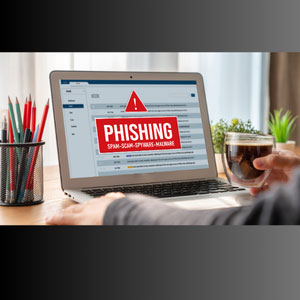 In today’s digital age, email scams have become increasingly sophisticated and deceptive, targeting unsuspecting individuals with a variety of tricks to steal money, personal data, and more. One particularly alarming scam that has been on the rise is the “fake vacation email.” This seemingly harmless message can disguise itself as a genuine notification about your upcoming holiday plans, but in reality, it is a ploy designed to drain your bank account and cause serious financial harm. Understanding the nature of this scam, how it works, and how to protect yourself is crucial to keeping your finances safe.
In today’s digital age, email scams have become increasingly sophisticated and deceptive, targeting unsuspecting individuals with a variety of tricks to steal money, personal data, and more. One particularly alarming scam that has been on the rise is the “fake vacation email.” This seemingly harmless message can disguise itself as a genuine notification about your upcoming holiday plans, but in reality, it is a ploy designed to drain your bank account and cause serious financial harm. Understanding the nature of this scam, how it works, and how to protect yourself is crucial to keeping your finances safe.
What is the Fake Vacation Email Scam?
Fake vacation email scams are phishing attacks that prey on people’s excitement and trust, and sometimes even their forgetfulness about travel plans. The scam email typically appears to be legitimate communication from a travel agency, airline, hotel, or vacation rental platform. It may include details about your “upcoming trip,” such as dates, destinations, and booking confirmation numbers, making it seem authentic and relevant.
Often, the message will contain urgent calls to action, such as asking you to confirm your booking, update payment information, or even pay a balance to secure the reservation. In some cases, the email might warn of canceled reservations unless immediate action is taken. These manipulative tactics pressure recipients to act quickly without verifying the information, leading them to click on malicious links or enter sensitive financial details.
How Does This Scam Drain Your Bank Account?
Phishing for Personal Information
The email includes links directing you to fake websites designed to look exactly like those of legitimate travel companies. Once on these sites, you might be asked to input credit card numbers, bank account details, or login credentials. This information is then harvested by scammers who can use it to make unauthorized transactions or sell the data on the dark web.
Malware Installation
By clicking on certain links or downloading attachments in the fake vacation email, you risk installing malware on your device. This malicious software can track your keystrokes, capture screenshots, or access files, giving cybercriminals direct access to your banking apps or personal financial records.
Direct Payment Requests
Some scam emails will ask you to make payments via wire transfers, prepaid gift cards, or cryptocurrency to an "account" supposedly linked to your trip. Since these payment methods are difficult or impossible to trace, once you send the money, it’s gone forever.
Warning Signs of a Fake Vacation Email
Recognizing a fake vacation email before it causes damage is vital. Here are common mistakes you should watch for:
Unexpected Travel Confirmations: Receiving a booking confirmation for a trip you did not book or forgot about.
Email Address Mismatches: The sender’s email address may be similar but slightly off from the official company’s domain (e.g., @travell-agency.com instead of @travelagency.com).
General Greetings: The email might begin with a generic greeting for example “Dear Customer” instead of your name.
Urgency and Threats: Messages pressuring immediate action or threatening cancellation or penalty fees if you don’t respond quickly.
Suspicious Links and Attachments: Links that don’t lead to official sites or attachments that look unusual or unsolicited.
Poor Grammar and Spelling Mistakes: Professional companies generally send polished emails; errors can indicate a scam.
How to Protect Yourself from Fake Vacation Emails
Verify Your Bookings Directly
Always cross-check your travel plans independently. Use official websites or trusted apps to review your reservations rather than clicking on links in emails. Contact the travel company directly via phone or official contact channels if you have any doubts.
Carefully Inspect the Sender’s Email Address
Look carefully at the sender’s details and authenticate that it matches the official domain of the travel company. Don’t just rely on the sender’s name; scammers can spoof display names to appear genuine.
Avoid Clicking Links or Downloading Attachments
If you receive an unexpected vacation email, don’t click on links or open attachments unless you are sure of their legitimacy. Instead, explore it manually on the company’s website or app.
Use Strong, Unique Passwords and Enable Two-Factor Authentication
Protect your online travel accounts and email with strong passwords, and enable two-factor authentication when available to prevent unauthorized access.
Keep Antivirus and Security Software Up-to-Date
Ensure your devices have updated antivirus software that can detect and block malware from phishing links or attachments.
Monitor Your Bank Accounts Regularly
Regularly check your bank and credit card statements for any unauthorized transactions and report suspicious activity immediately.
Educate Yourself and Others
Awareness is critical. Make sure you and those around you know about this scam and how to identify suspicious emails. Cybercriminal tactics evolve quickly, so staying informed is your best defense.
What to Do If You’ve Been Scammed
If you suspect you’ve fallen victim to a fake vacation email scam, act swiftly:
Contact Your Bank or Credit Card Company
Immediately report unauthorized charges or suspicious activity to your financial institution to freeze accounts or cards if needed.
Change Your Passwords
Change passwords for your email, online banking, and any related accounts to prevent further unauthorized access.
Report the Scam
File a report with your country’s cybercrime or consumer protection agency. In the U.S., you can report to the Federal Trade Commission (FTC) or the Internet Crime Complaint Center (IC3).
Scan Your Device
Run a comprehensive antivirus and anti-malware check to find and delete any malicious software that may have been installed.
Warn Others
Share your experience with family, friends, or colleagues to help raise awareness about this scam.
Final Thoughts
The fake vacation email scam is a perfect example of how cybercriminals manipulate trust and urgency to exploit everyday activities like travel. As vacations and travel bookings increasingly move online, scammers are poised to take advantage of busy, distracted consumers.
Protecting yourself involves vigilance, verifying all communications through official channels, and practicing good cybersecurity hygiene. By taking these precautions, you can enjoy your trips with peace of mind and avoid becoming a victim of a scam that could drain your bank account.
Stay alert, stay safe, and don’t let a fake vacation email ruin your getaway or your finances.
Start with a FREE Network Assessment to identify vulnerabilities and safeguard your data against cyberthreats.






